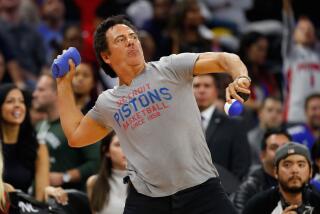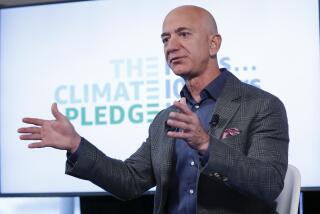L.A. Billionaire Takes Stake in GM
Billionaire Los Angeles investor Kirk Kerkorian said Wednesday that he had taken a large stake in General Motors Corp. and wanted to buy more, a move viewed by Wall Street as a potential catalyst for a turnaround at the world’s biggest automaker.
Kerkorian, who shook up Chrysler Corp. with a hostile takeover bid a decade ago, said he owned nearly 4% of GM shares and planned to spend $868 million to more than double that investment. The announcement drove up GM’s stock by 18%, its biggest one-day gain in decades.
Kerkorian’s involvement comes as GM Chief Executive Rick Wagoner is trying to end a prolonged slump that has led to the company’s smallest U.S. market share in almost 80 years. GM, which last month reported a $1.1-billion first-quarter loss, is trying to shore up its finances in part by winning large healthcare concessions from union workers.
The move by the 87-year-old Kerkorian essentially is a major bet that GM’s stock has hit bottom, but it also probably signals new pressure on the company to slash costs, many Wall Street analysts and other GM investors said. They noted that Kerkorian, with a fortune estimated at $8.9 billion, has a history of getting actively involved in companies in which he invests.
“This has the potential for significantly altering the course at GM,” said auto industry analyst Sean Egan of Philadelphia-based bond-rating firm Egan-Jones Ratings Co.
Indeed, many industry experts say Kerkorian’s presence may spur GM’s management, and give it a bargaining advantage, in its efforts to extract financial sacrifices from the company’s unions, particularly on healthcare costs.
“Boy oh boy, is this the stick they need,” said Diane Jaffee, a fund manager at TCW Group Inc. in New York.
In turn, benefit cuts at GM could have a ripple effect in U.S. industry, encouraging other companies to squeeze such costs.
GM, which has been losing market share to Asian automakers for decades, is negotiating with the United Auto Workers to trim the $5.6 billion it expects to pay for employee health costs this year. The company also faces $87 billion in pension liabilities. Some analysts have raised the possibility that GM could file for bankruptcy as a radical way to buttress its eroding finances.
Kerkorian’s investment company, Tracinda Corp., characterized his GM stake as “definitely a passive investment.” Kerkorian “values GM for its strong asset position, its strong cash position ... and believes it can use those assets to get healthy again,” Tracinda attorney Terry Christensen said.
GM said it “typically does not express a view on specific investor activity.” The UAW, which represents 120,000 GM workers in the United States who would be affected by any dramatic shake-up at the company, declined to comment about Kerkorian.
Brokerage giant Merrill Lynch & Co., which had recommended that clients sell GM shares, upgraded its rating to “neutral” on Wednesday, citing the likelihood that Kerkorian would prompt management to “unlock value” in GM’s noncore businesses. One possibility: the automaker’s huge GMAC financial services business.
Some analysts say GMAC’s nonautomotive financial businesses could fetch $14 billion through a restructuring, asset sale or other steps. That’s nearly equal to what GM’s entire stock market value had been before Wednesday’s move by Kerkorian.
New York money manager Guy Wyser-Pratte, a longtime investor in takeover fights, has known Kerkorian since the 1960s.
“Kirk is a very smooth guy and a very good manager, but he doesn’t take no for an answer,” Wyser-Pratte said. “He may be able to spark some brains” at GM into understanding that the automaker must “retool.”
Kerkorian announced that he owned 22 million shares, acquired at an average cost of $26.33 apiece. He offered to buy as many as 28 million more shares at $31 each in a tender offer, meaning investors could sell their shares directly to Tracinda at that price.
GM shares closed at $32.80 on the New York Stock Exchange, up $5.03 and $1.80 above Kerkorian’s offer price. It isn’t clear how many investors would sell to him at the offer price, but Kerkorian’s interest was viewed as at least putting a floor of $31 under the stock for the time being. The jump in the share price boosted the value of Kerkorian’s existing stake by $111 million.
In mid-April, GM shares plunged to a 12-year low of $25.60 as investors focused on the company’s sinking vehicle sales and high operating costs. The nation’s major bond-rating firms also warned that they might soon downgrade GM’s huge bond debt to “junk” status.
John Kornitzer, head of Kornitzer Capital Management in Shawnee Mission, Kan., and a GM shareholder, said Kerkorian must believe that GM could reduce its costs to boost profit and lift the stock.
“He’s not buying at $31 because he thinks he’s only going to get $31 for it” later, Kornitzer said.
But another camp on Wall Street is suspicious of Kerkorian, who has long been a savvy wheeler-dealer with investments. One concern: He might be looking for GM to pay him to go away, a practice known as greenmail.
At 87, “Kerkorian is no spring chicken,” said Barry Ritholtz, chief market strategist at brokerage Maxim Group in New York. “Is he planning to oversee a five-year turnaround plan?”
One major task for the company is to halt a steady decline in auto sales in the United States, the world’s biggest market. At the end of April, GM’s share was down to 25.6%, about half of what it was 40 years ago. Yet after decades of downsizing -- GM has cut its auto employment by 40% since 1992 -- it still has too much manufacturing capacity, enough to supply 35% of the market, analysts say.
The sales slide has continued as Japanese rivals have seen their market share rise. Toyota Motor Corp. and Honda Motor Co. have generated a lot of buzz with their popular, gas-stingy hybrid-powered vehicles. Although GM remains a powerhouse in pickup trucks, sales of its big gas-guzzling vehicles are sliding as fuel prices rise.
“Toyota has three brands in the U.S. and is very successful; GM has eight brands” and is losing money and market share, analyst Egan said.
Another problem is that GM’s annual healthcare costs have reached a “crisis” stage, Wagoner has said. Although the company is talking with the UAW about finding a resolution, new contract talks won’t come up until 2007. Healthcare costs add $1,500 to the price of each GM vehicle, Wagoner said, versus about $300 for Toyota in this country.
Whatever Kerkorian’s ultimate plan, his move on GM flies in the face of conventional Wall Street wisdom that automakers are poor investments.
“Someone as rich and smart as Kerkorian doesn’t throw his money around without expecting a return,” said David Cole, president of the Center for Automotive Research in Ann Arbor, Mich. “He’s saying with his offer that he believes GM has a tremendously undervalued set of assets.”
Most investors Kerkorian’s age are making inheritance and estate plans rather than massive new investments in major American companies.
Kerkorian, the son of an Armenian immigrant rancher in the San Joaquin Valley, built his fortune buying struggling casinos and airlines and riding their soaring stock values as he rejuvenated them. In 1967, he parlayed his $3-million investment in Trans International Airways into $149 million when he sold it to Transamerica Corp. He bought his first property in Las Vegas in 1967 and built the 1,500-room International Hotel.
Today, Tracinda is majority owner of MGM Mirage Inc., one of the largest hotel and casino owners in Las Vegas. Kerkorian also bought -- and sold -- Metro-Goldwyn-Mayer Inc. three times. The most recent sale, for $4.9 billion to a consortium led by Sony Corp., closed last month.
Kerkorian got into the auto business in 1990 by investing in a faltering Chrysler Corp. In 1995, he teamed with former Chrysler boss Lee Iacocca in a hostile takeover bid for the company that failed when he was unable to raise the financing.
But Kerkorian wound up as one of Chrysler’s biggest shareholders and continued to push for changes. In 1998 he supported the merger of Chrysler and German automaker Daimler-Benz. Two years later he sued, saying the deal wasn’t really a merger of equals, as had been advertised, but a takeover of Chrysler. Testimony in the suit revealed that Kerkorian made about $2.7 billion on his Chrysler investment. Last month, a U.S. District Court in Delaware ruled against Kerkorian in his suit; Tracinda is appealing.
A key difference between Kerkorian’s current GM stake and his Chrysler bid is that he teamed with an insider. Iacocca knew Chrysler intimately and had credibility with investors when he suggested ways to fix its problems, said Karen H. Wruck, associate finance professor at Ohio State University.
Although Christensen, the Tracinda attorney, said Kerkorian had no agenda with GM, many observers were dubious.
“You don’t take a position of this size without wanting a seat on the board sooner or later,” Wruck said.
*
Times staff writer Thomas S. Mulligan in New York contributed to this report.
*
(BEGIN TEXT OF INFOBOX)
Kirk Kerkorian: Dealing through the years
Metro-Goldwyn-Mayer
1969: Kerkorian buys control of the studio and installs a new president.
1981: Merges United Artists with MGM.
1986: Sells MGM/UA to Ted Turner and months later buys back most of it.
1990: Sells MGM/UA to an Italian financier.
1996: Buys MGM for a third time, and several top executives leave as overhead costs are targeted.
1999: Puts in a new management team.
September: Announces he will sell MGM to Sony for $4.9 billion.
Chrysler
1990: Buys 22 million shares of Chrysler stock.
1991: Buys 6 million more shares in a new Chrysler offering.
1994: Prods the company to boost its dividend and change its shareholder rights plan.
1995: With other investors, unsuccessfully tries to take over Chrysler. Under pressure, the automaker doubles a stock buyback plan, and Kerkorian forces out a prominent board member at the company.
1996: Chrysler gives a board seat to a Kerkorian ally and changes its corporate governance policy in exchange for his agreeing not to wage another takeover fight for five years.
1998: He gives his support to the merger with Daimler-Benz.
2001: Reduces his stake in DaimlerChrysler by almost a third.
April: Judge rules for DaimlerChrysler in Kerkorian’s lawsuit over the company’s 1998 merger.
Gaming and hotels
1969: Kerkorian acquires the Flamingo hotel-casino in Las Vegas and builds the International Hotel.
1970-71: Sells the two Las Vegas properties to Hilton Hotels.
1973: Builds the MGM Grand in Las Vegas.
1980: Spins off MGM’s casino operations into separate public companies but retains control.
1985: Buys the 30% of MGM Grand Hotels he doesn’t own and months later sells its Las Vegas and Reno hotels.
1987: Agrees to buy the Desert Inn and Sands hotels in Las Vegas.
1993: Opens the $1-billion MGM Grand Hotel, Casino & Theme Park in Las Vegas.
2000: MGM Grand buys Mirage Resorts for $4.4 billion.
June: MGM Mirage announces that it will buy Mandalay Resort Group, dramatically increasing Kerkorian’s investment on the Las Vegas Strip.
Other
1948: Kerkorian founds a charter airline, which becomes Trans International Airlines.
1962: Sells airline to automaker Studebaker.
1964: Buys the airline back.
1968: Sells the carrier to Transamerica. Acquires a controlling stake in Western Airlines.
1976: Sells his remaining stake in Western Airlines.
1984: Makes abortive effort to acquire control of Walt Disney Productions.
1987: Starts luxury airline MGM Grand Air. Tries to take over Pan American World Airways.
1991: Makes a failed bid for Trans World Airlines.
1992: Shuts down MGM Grand Air.
Source: Times research
Los Angeles Times






